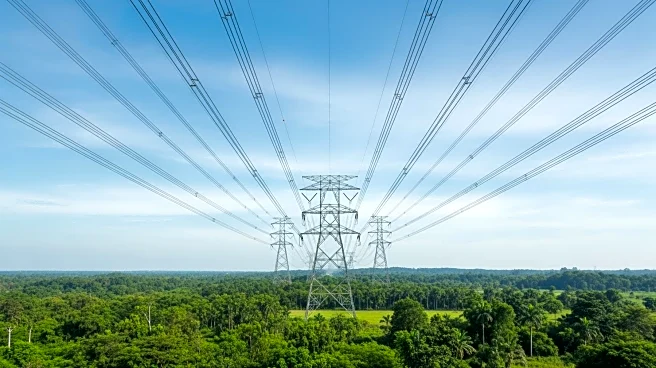What's Happening?
The Philippines is actively promoting the Enhanced ASEAN Power Grid (APG) as a key initiative to improve energy security and facilitate the deployment of renewable energy across Southeast Asia. During
the Singapore International Energy Week (SIEW) 2025, Department of Energy Secretary Sharon S. Garin emphasized the Philippines' commitment to regional energy integration, highlighting plans for a bilateral power interconnection with Malaysia. This connection aims to enhance energy security, diversify supply, and increase grid stability. The Philippines is positioning itself as a leader in the energy transition, leveraging its natural renewable energy resources and policy frameworks to drive sustainability in the region.
Why It's Important?
The Enhanced ASEAN Power Grid represents a significant step towards a truly integrated energy market in Southeast Asia, fostering greater energy resilience and facilitating the larger-scale deployment of renewable energy. For the Philippines, this initiative is crucial for achieving energy security and stability, while for ASEAN, it marks progress towards collective climate goals. The Philippines' proactive approach to renewable energy investment, including the Green Energy Auction Program, positions it as a hub for green investment, offering a blueprint for other member states. This focus on regional energy integration and sustainability is expected to be a priority during the Philippines' ASEAN Chairmanship in 2026.
What's Next?
As the Philippines prepares for its ASEAN Chairmanship in 2026, the emphasis on regional energy integration and renewable energy deployment will likely define its leadership agenda. The country plans to explore further interconnections and harmonize national policies to ensure seamless operation across borders. The development of a carbon credit policy framework and nuclear energy programs are also part of the comprehensive strategy towards a low-carbon future. These initiatives offer significant opportunities for ASEAN to collectively achieve its climate goals, with the Philippines leading the charge towards a cleaner, more secure, and interconnected energy landscape.
Beyond the Headlines
The Philippines' approach to energy resilience, particularly through the deployment of Mobile Energy Systems in typhoon-prone areas, showcases its leadership in climate adaptation within the energy sector. This people-centered approach offers valuable lessons for ASEAN nations facing similar vulnerabilities. The focus on harmonized technical standards, compatible market mechanisms, and stable cross-border governance forms the foundation for collective progress in regional energy integration.











